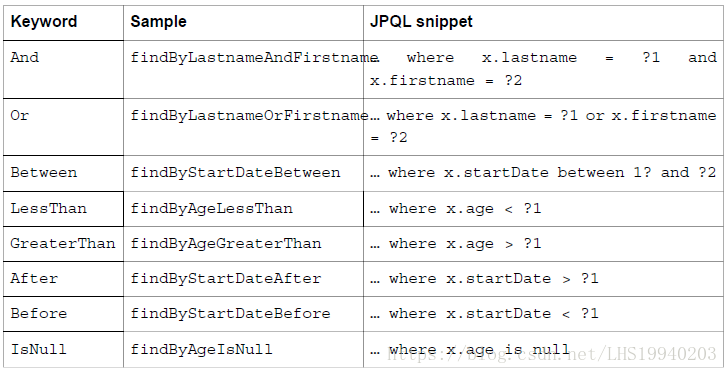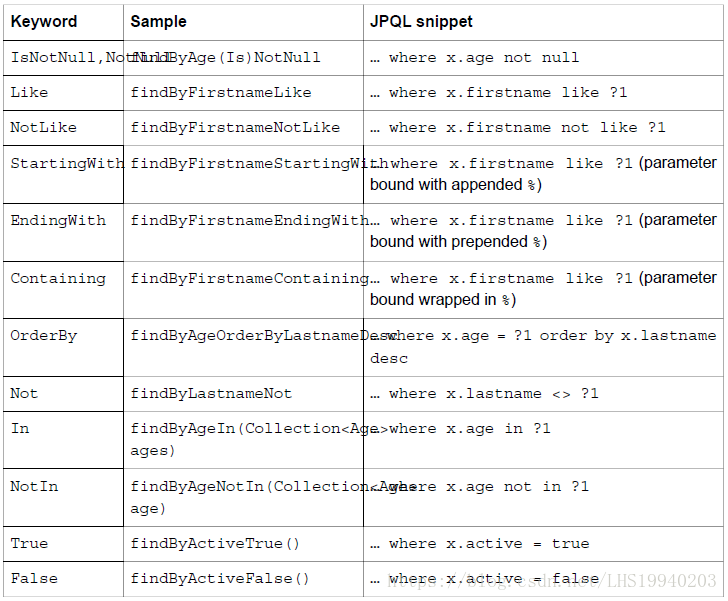您好,登錄后才能下訂單哦!
您好,登錄后才能下訂單哦!
這篇文章給大家介紹繼承jpa Repository 寫自定義方法查詢的實例分析,內容非常詳細,感興趣的小伙伴們可以參考借鑒,希望對大家能有所幫助。
今天在寫jpa查詢的時候,遇到了添加自定義方法,項目啟動報錯原因,現總結如下:
@Entity
@Table(name = "user")
Class User{
@Id
@GeneratedValue
int id;
@Column
String age;
@Column
String school;
@Column
String userName;
set,get方法 (省略)
}public interface UserRepository extends JpaRepository<User, Long> {
List<User> findByUsernameLike(String username);
List<User> aaa();
}啟動項目時,
org.springframework.data.mapping.PropertyReferenceException: No property aaa found for type com.fpi.safety.common.entity.po.User
再將List<User> aaa();方法去掉后,項目又可以正常啟動運行
經查找,原來是繼承jpa,必須滿足一些規則,規則如下


Spring Data JPA框架在進行方法名解析時,會先把方法名多余的前綴截取掉,比如find,findBy,read,readBy,get,getBy,然后對剩下的部分進行解析。
假如創建如下的查詢:findByUserName(),框架在解析該方法時,首先剔除findBy,然后對剩下的屬性進行解析,假設查詢實體為User
1:先判斷userName(根據POJO規范,首字母變為小寫)是否為查詢實體的一個屬性,如果是,則表示根據該屬性進行查詢;如果沒有該屬性,繼續第二步;
2:從右往左截取第一個大寫字母開頭的字符串此處是Name),然后檢查剩下的字符串是否為查詢實體的一個屬性,如果是,則表示根據該屬性進行查詢;如果沒有該屬性,則重復第二步,繼續從右往左截取;最后假設用戶為查詢實體的一個屬性;
3:接著處理剩下部分(UserName),先判斷用戶所對應的類型是否有userName屬性,如果有,則表示該方法最終是根據“User.userName”的取值進行查詢;否則繼續按照步驟2的規則從右往左截取,最終表示根據“User.userName”的值進行查詢。
4:可能會存在一種特殊情況,比如User包含一個的屬性,也有一個userNameChange屬性,此時會存在混合。可以明確在屬性之間加上“_”以顯式表達意思,比如“findByUser_NameChange )“或者”findByUserName_Change()“
從上面,我們可以得知,jap在解析是,aaa在user類中是沒有屬性的,所以報錯No property aaa found.
如果我們想要使用jap框架,又不想再多增加一個自定義類,則必須符合其命名規則
如果,你記不住jpa的規則也沒關系,你可以自己再多寫一個類來實現自定義查詢方法
如下:
1. 自定義一個接口,該接口用來聲明自己額外定義的查詢。
public interface UseerRepositoryTwo {
public List<User> searchUser(String name, int id);
}2. 創建一個接口,該接口 extends JpaRepository 或者 CurdRepository, 以及上面自己定義的接口 UseerRepositoryTwo
public interface UserRepositoryTwoService extends CrudRepository<LogDTO, Integer>, CustomizedLogRepository {
}3. 實現UserRepositoryTwoService
注意此處的類名,必須以 2 中創建的接口的名字UserRepositoryTwoService,后面加上 Impl 來聲明,而不是寫成 UseerRepositoryTwoImpl
public class UserRepositoryTwoServiceImpl implements UserRepositoryTwoService {
@Autowired
@PersistenceContext
private EntityManager entityManager;
@Override
public List<User> searchLogs(int Id, String name) {
......
}
}自己在寫自定義實現即可~
| Keyword | Sample | JPQL |
|---|---|---|
| And | findByLastnameAndFirstname | where x.lastname=?1 and x.firstname=?2 |
| Or | findByLastnameOrFirstname | where x.lastname=?1 or x.firstname=?2 |
| Between | findByStartDateBetween | where x.startDate between ?1 and ?2 |
| LessThan | findByAgeLessThan | where x.startDate < ?1 |
| GreaterThan | findByAgeGreaterThan | where x.startDate >?1 |
| After | findByStartDateAfter | where x.startDate >n ?1 |
| Before | findByStartDateBefore | where x.startDate < ?1 |
| IsNull | findByAgeIsNull | where x.age is null |
| IsNotNull,NotNull | findByAge(Is)NotNull | where x.age not null |
| Like | findByFirstnameLike | where x.firstname like ?1 |
| notLike | findByFirstnameNotLike | where x.firstname not like ?1 |
| StartingWith | findByFirstnameStartingWithXXX | where x.firstname like ?1(parameter bound with appended %) |
| EndingWith | findByFirstnameEndingWithXXX | where x.firstname like ?1(parameter bound with appended %) |
| Containing | findByFirstnameContaining | where x.firstname like ?1(parameter bound wrapped in %) |
| OrderBy | findByAgeOrderByLastname | where x.age = ?1 order by x.lastname desc |
| Not | findByLastnameNot | where x.lastname <> ?1 |
| NotIn | findByAgeNotIn(Collection age ) | where x.age not in ?1 |
| True | findByActiveTrue() | where x.active = true |
| False | findByActiveFalse() | where x.active = false |
例:
@RepositoryDefinition(domainClass = Employee.class, idClass = Integer.class)
public interface EmployeeRepository { //extends Repository<Employee,Integer>{
public Employee findByName(String name);
// where name like ?% and age <?
public List<Employee> findByNameStartingWithAndAgeLessThan(String name, Integer age);
// where name like %? and age <?
public List<Employee> findByNameEndingWithAndAgeLessThan(String name, Integer age);
// where name in (?,?....) or age <?
public List<Employee> findByNameInOrAgeLessThan(List<String> names, Integer age);
// where name in (?,?....) and age <?
public List<Employee> findByNameInAndAgeLessThan(List<String> names, Integer age);
@Query("select o from Employee o where id=(select max(id) from Employee t1)")
public Employee getEmployeeByMaxId();
@Query("select o from Employee o where o.name=?1 and o.age=?2")
public List<Employee> queryParams1(String name, Integer age);
@Query("select o from Employee o where o.name=:name and o.age=:age")
public List<Employee> queryParams2(@Param("name")String name, @Param("age")Integer age);
@Query("select o from Employee o where o.name like %?1%")
public List<Employee> queryLike1(String name);
@Query("select o from Employee o where o.name like %:name%")
public List<Employee> queryLike2(@Param("name")String name);
@Query(nativeQuery = true, value = "select count(1) from employee")//這個使用了原生sql
public long getCount();
@Modifying
@Query("update Employee o set o.age = :age where o.id = :id")
public void update(@Param("id")Integer id, @Param("age")Integer age);
}關于繼承jpa Repository 寫自定義方法查詢的實例分析就分享到這里了,希望以上內容可以對大家有一定的幫助,可以學到更多知識。如果覺得文章不錯,可以把它分享出去讓更多的人看到。
免責聲明:本站發布的內容(圖片、視頻和文字)以原創、轉載和分享為主,文章觀點不代表本網站立場,如果涉及侵權請聯系站長郵箱:is@yisu.com進行舉報,并提供相關證據,一經查實,將立刻刪除涉嫌侵權內容。